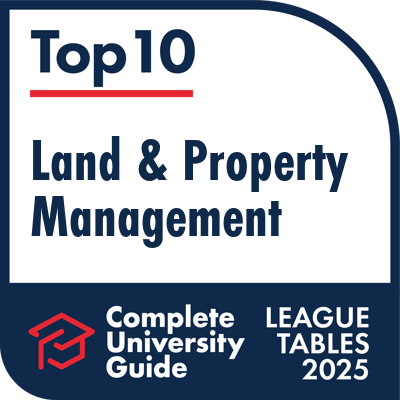MSc Rural Estate Management
This RICS accredited Master's is highly-regarded for equipping students for a fulfilling career rural land and property management.
Course overview
Designed for those with an undergraduate degree outside the rural property sector, this course offers the fastest route to attain chartered surveyor status as a Rural Surveyor.
Prioritising sustainable approaches to management, the programme focusses on rural situations, encompassing farms, woodlands, residential spaces and developments. You will study rural planning, rural property valuation, building basics, property law, and management. There is a strong focus on sustainability, ensuring you know how to advise on best practice for farms, estates, and other rural businesses. This will give you a well-rounded view of the challenges and opportunities in rural land management.
The MSc has full accreditation from the Royal Institution of Chartered Surveyors (RICS). Those opting for part time study, who are already engaged in relevant professional work, can commence their Assessment of Professional Competence (APC) registration process with the RICS upon enrolment.
Many graduates from this course also attain fellowship of the Central Association of Agricultural Valuers (CAAV).

If you are interested in finding out more about the Royal Institution of Chartered Surveyors (RICS), they have produced this short video highlighting their work.

Course content
You will study four modules in the first (autumn) semester followed by four modules in the second (spring) semester, and complete your research project by the end of September. You will attend lectures and group tutorials. There is also a range of practical sessions and visits to local farms, commercial properties and rural estates where owners, occupiers and their professional advisors can provide additional insights into the management of rural property.
Assessed coursework features strongly throughout the course. Examinations will take place in January and June. Prior to starting the MSc, students receive reading lists and study material so that they can develop a basic grounding in study areas with which they are not familiar.
Here at the RAU we are always looking for ways to better support our students. We recognise that a number of our students may be working or have caring responsibilities alongside studying which can sometimes make it difficult to attend every teaching session in person. As such we have the ability for you to join lectures and seminars through an alternative digital format in prior discussion with your programme leader. Please note that for international students on a student visa you are expected to attend your classes in person. Remote delivery is not an UKVI authorised mode of attendance for the taught element of your course and therefore non-attendance would affect your student visa.
The in-person teaching sessions are timetabled on Wednesdays and Thursdays each week for the full year (both semesters) which allows you to fulfil other commitments you may have, such as work, family and interests. For part-time students the sessions are timetabled on one day per week only.
If you are interested in studying this subject but cannot commit to the full MSc programme it is also possible to study for a Certificate or Diploma in the subject.
What is a Postgraduate Certificate?
The PgCert - or Postgraduate Certificate - is the shortest of our Master's level offerings, which is completed by studying four modules (60 credits). It allows you to study a specific area of the course in depth but takes less time to complete than the MSc or PgDip.
The PgCert is a great way of fitting postgraduate study around a busy life. Full-time students can complete the course in as little as one year. Part-time students can choose to spread the course up to two years, giving you lots of time for thinking and writing between modules. It is ideal if you want to study a specific subject but would rather not commit to a full MSc with its attendant time and financial costs.
It can be a great way into a career in a new industry but if you desire to continue your studies, PgCert credits can be used to contribute towards a PgDip or even an MSc qualification later down the line. Completing studies using this route is often likened to building blocks – one step at a time – the first step being a PgCert.
Please note that overseas applicants who require a student visa cannot be considered for this course as the weekly contact hours do not meet the UKVI threshold for a full-time Student visa.
What is a Postgraduate Diploma?
The PgDip - or Postgraduate Diploma – is a level 7 course that sits between the PgCert and the full MSc. It allows you to study a subject in depth but without undertaking the Dissertation element. Consequently, it takes substantially less time to complete than the MSc, while still covering the same taught elements. To complete this qualification, you will take eight modules (120 credits).
Full-time students can complete the course in as little as two semesters (one year). Part-time students can choose to spread the course over up to two years, giving you lots of time for thinking and writing between modules. It is ideal for students who want to study a specific subject but would rather not commit to a full MSc with its attendant time and financial costs.
The PgDip can be a great way to boost your career, or enter a new industry. We recognise that life can be unpredictable so the PgDip is built to be as flexible as possible. Should you desire to continue your studies, PgDip credits can be used to contribute towards an MSc qualification later down the line. Conversely, if you need to cut your studies short for any reason, it is also possible to convert the PgDip to a PgCert after the completion of four modules.
Please note, Visa students must be full-time (a min of 15 hours per week) and will need to attend all sessions in person due to UKVI visa requirements.
The modules available for this MSc course are shown below. They may change for your year of study as we regularly review our module offerings to ensure they’re informed by the latest research and teaching methods.
Modules
- Integrated Agricultural Systems
- Land and Estate Management Strategy and Professional Practice
- Planning and Development
- Rural Land and Property in Society
- Research Skills:
- Farm Business and Enterprise Management
- Rural Property Law
- Management of Woodlands and the Natural Environment
- Rural Valuation Practice
- Dissertation
A description of each module can be found here.
Disclaimer information
The University has established various rules and regulations that you must agree to and follow if you accept an offer to study with us. View our full disclaimer notice.
Careers and graduate destinations
- Rural estate management
- Land and property consultancy
- Valuation
- Residential sales and lettings
- Entrepreneur / business management
- Utilities and compulsory purchase
"Completing the MSc Rural Estate Management course at the RAU has given me a solid foundation from which I have been able to develop the beginning of my career, providing a grounding in various competencies. Since graduating, I have hit the ground running with my career as a Graduate Surveyor at Batcheller Monkhouse in West Sussex."
Luke Davis, Graduate
Entry requirements
We welcome applications from applicants with non-standard qualifications who are able to demonstrate knowledge, experience (in farming, property or countryside management) and skills developed in the workplace or elsewhere and which are relevant to the programme of study. Applicants will need to use their personal statement to provide further details supported by a CV. All non-standard applications will be considered by the Programme Manager on a case-by-case basis and applicants can expect that an interview may be required as part of the admissions process.
If English is not your first language, you will need to reach the requirements outlined in our English language requirements for the level of study. For postgraduate taught programmes this is IELTS Academic min. overall 6.5 with no element below 5.5 (or equivalent). English language tests usually have a validity of two years from the date the test is taken.
Offers will typically be made in line with the academic requirements set out above. Offers can be conditional or unconditional. An unconditional offer will be made to applicants who have already met the conditions and provided evidence that conditions have been met. Where academic or language requirements have not yet been fulfilled, applicants will receive a conditional offer stating the requirements that must be met.
Fees
2026-27 Applicants
For the academic year 2026-27 the tuition fees for the MSc are:
| UK | Overseas/EU | |
|---|---|---|
| Full-time | £12,000 per year | £22,000 per year |
| Part-time | Fees are calculated on a pro-rata basis depending on the number of modules taken. Please refer to Tuition Fees webpage | Fees are calculated on a pro-rata basis depending on the number of modules taken. Please refer to Tuition Fees webpage |
For the academic year 2026-27 the tuition fees for the PgDip are:
| UK | Overseas/EU | |
|---|---|---|
| Full-time | £8,000 per year | £14,700 per year |
| Part-time | Fees are calculated on a pro-rata basis depending on the number of modules taken. Please refer to Tuition Fees webpage | N/A |
For the academic year 2026-27 the tuition fees for the PgCert are:
| UK | Overseas/EU | |
|---|---|---|
| Full-time | £4,000 per year | £7,350 per year |
| Part-time | Fees are calculated on a pro-rata basis depending on the number of modules taken. Please refer to Tuition Fees webpage | N/A |
Tuition fees may be subject to an inflationary increase each year as set out in our Access and Participation Plan.
For full details, please visit the fees and funding webpage.
Please note: International students can study on a part-time basis only if they are in the UK with a different type of visa (other than Student Visa/Tier 4 General) that allows them to undertake part-time study and their visa does not expire prior to the end date of the proposed course of study.
Scholarships
The University offers a range of generous fee waivers and bursaries. To find out more about the scholarships, awards and bursaries available, please visit the scholarships webpage.
Apply now for September 2026 entry
To apply for a postgraduate course you need to complete an online application form. This can be found by selecting your preferred course option at the bottom of this box.
Alternatively, if you cannot access the online form please call Admissions on 01285 889912, or email admissions@rau.ac.uk.
We recommend you keep a copy of the completed form for your records.
Important Information for EU and Overseas applicants for PgDip: EU and Overseas applicants who wish to apply for the PgDip programme, and need a UK study visa to do so, should be aware that upon completion of their study they will not be eligible to apply for a Graduate Route visa.
Important Information for EU and Overseas applicants for PgCert: The PgCert programme is equivalent to part-time study for UKVI student visa purposes. Please note that the University only sponsors full-time PgDip and MSc level students.
EU and Overseas students who hold another UK immigration status/visa can be considered for the PgCert provided their visa/status allows study at the time of application and covers the entire period of study.
Application deadline, September entry:
- EU and overseas applicants must submit their application by 29 June 2026
- UK applicants must submit their applications by 1 September 2026
Results deadline, September entry:
- EU and overseas applicants will need to meet their conditions by 31 July 2026
- UK applicants will need to meet their conditions by 14 September 2026
If you are applying for a 2026 Chevening Scholarship you can submit your scholarship application prior to receiving a course offer. Further details can be found on the application timeline and eligibility criteria sections on the Chevening website.
Applicants will be notified via email once a decision has been made and decision letters will be emailed to you. If there is a deadline by which applicants must accept an offer of admission or pay a deposit, this will be stated in the offer letter.
Requests to defer the year of entry will be considered only when an applicant holds an Unconditional offer and needs to be submitted in writing to the admissions team. We cannot guarantee that requests will be granted. Decisions on deferral requests are considered:
- For September entry at the end of August
If the deferral request is granted applicants will receive a new offer letter with tuition fees which are applicable to their year of entry, at the opening of the next admissions cycle.




